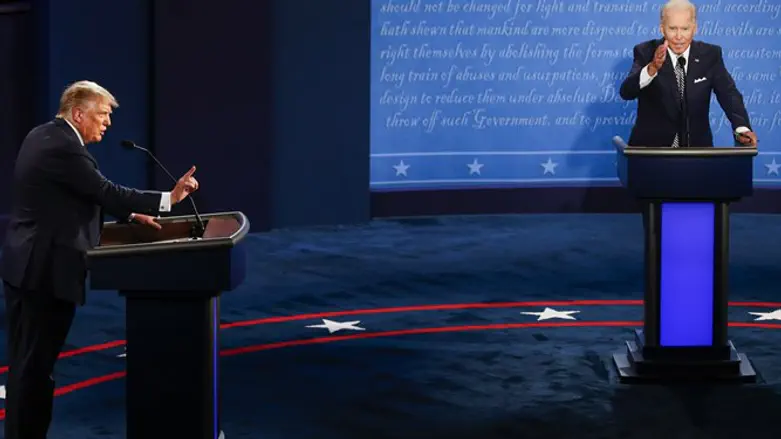
Although many analysts and observers considered the first debate that took place between President Donald Trump and Democratic candidate Joe Biden to be a debate of “personal insults” par excellence, the reality indicates that it did not deviate much from the pattern of much of the electoral debates in the previous rounds of the American presidential elections throughout that country's history.
It is true that the intensity of personal insults increased in this debate for two main factors, the first of which is the fraught and unusual atmosphere in which the debate took place, especially the personal reciprocal accusations that preceded the debate, and the second is the nature of the candidates and the size of the unprecedented political differences between the Republican president and the elite in the Democratic Party.
What can be said is that this debate was held in an unfamiliar atmosphere and between two personalities, one of whom is an unconventional politician (President Trump) and the other is one who is very eager to succeed in his third and final attempt to reach the presidency in the White House.
In fact, the personal insults that dominated the first debate constitute one of the most prominent manifestations of the change taking place in the American political and electoral culture, a culture that is not limited to debates, but rather appears throughout the political and partisan scene, where there are many personal insults that exceed the limit of political and partisan criticism. As a case in point, everyone remembers the amount of mutual insults between President Trump and Democratic US House Speaker Nancy Pelosi.
All the points of contention on which President Trump clashed with his Democratic opponent in the upcoming elections, Joe Biden, came as expected, about Russia and the current US administration’s handling of the Corona pandemic, the issue of reforming the health care system, and ways to revive the US economy and get it out of the slump caused by the Corona crisis. .
Perhaps the harshest accusations made by the Democratic candidate Biden against President Trump came against the backdrop of US-Russian relations, so that Biden described the current president as a “puppy” of President Putin. I believe that the Democratic candidate intended to go to the maximum level of political drama at this point in order to confuse his Republican rival, to confuse him so that Trump could not focus in the rest of the debate points, which happened remarkably in the rest of the debate.
The debate in the way it came out was not expected to bring about major changes in the attitudes of the voters. Moreover, I do not think that the rest of the debates, if they take place after Trump's illness, will make a difference, because attitudes and opinions are being formed according to more influential factors. These include the extent to which they are affected by the economic reality and personal trends about the performance of the President Trump administration in the Corona crisis and in dealing with catastrophic incidents that nearly undermined the foundations of American social cohesion, such as the White House’s slowdown in dealing with incidents dominated by racism.
Therefore, the two remaining debates prior to the American presidential elections will not - in my opinion, be a weighing factor in the voting nor the trends of American public opinion, as it is most likely that the next two debates will be a duplicate of the first one, because the atmosphere between the candidates does not provide any opportunity to present a clear and specific political position on any internal or external issue. The debates seem like a personal quarrel that is difficult to control, and turn into a personal review of positions and opinions, and then they can turn into a ground for personal insults.
Although the results of opinion polls indicate that the Democratic candidate has an advantage by about ten points, the recent experience in the US presidential election, in which President Trump won over his Democratic rival Hillary Clinton, provides us with an important lesson regarding caution against overconfidence in opinion poll results.
The current atmosphere appears similar to the atmosphere that preceded the 2016 elections, in addition to the fact that President Trump seems not ready to accept any electoral loss easily, and he may make any decision or take a sudden move in foreign policy in particular, which enhances his chances of winning those elections, or at least makes it difficult for the American voter to vote for change in circumstances that may arise from any possible decision or move such as war or the outbreak of a crisis with a big country - or any other possible similar scenario.
What is certain is that the upcoming US presidential elections will witness an unprecedented situation, not only in terms of the political conditions and environment in which they are held, but also because of the unprecedented and unfamiliar reactions they may witness in American politics.
It is very important to realize that the election timing, which is this coming November, may be one of the weighing factors beside the trends of the Corona virus outbreak in the country. As developments accelerate, questions arise about the extent to which the American voter is prepared to accept change in the event that the Corona crisis worsens in light of a possible second wave. This puts at stake the elections and the idea of change.
Dr. Salem AlKetbi is a UAE political analyst and former Federal National Council candidate.